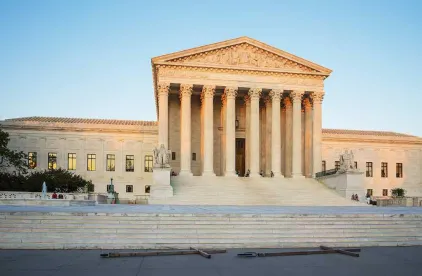Of the four cases decided today, the one that likely pertains to the largest number of this blog’s readers is Coinbase, Inc. v. Bielski, a 5-4 opinion delivered by Justice Kavanaugh, who wrote for himself, the Chief Justice, and Justices Alito, Gorsuch, and Barrett. Interestingly, Justice Thomas largely joined Justice Jackson’s dissenting opinion.
Coinbase is a case from which defendants will take great strength. The issue is whether a federal district court must stay judicial proceedings when there is an ongoing appeal on the question of arbitrability.
The Federal Arbitration Act, 9 U. S. C. §16(a), authorizes an interlocutory appeal from the denial of a motion to compel arbitration. However, the FAA provision is silent as to whether a stay must be granted. The Court rests its conclusion that a stay pending interlocutory appeal is mandatory on its holding in Griggs v. Provident Consumer Discount Co., 459 U. S. 56, 58 (1982) that appeal, including an interlocutory appeal, “divests the district court of its control over those aspects of the case involved in the appeal.” Because the question on appeal is whether the case belongs in arbitration or instead in the district court, the entire case is essentially “involved in the appeal,” quoting Griggs, and that dictates that the district court stay its proceedings while the interlocutory appeal on arbitrability is ongoing. Justice Kavanaugh finds comfort in the fact that most courts of appeals and leading treatises agree with this conclusion.
Justice Jackson’s dissent begins with the criticism that the majority’s decision is anti-textual, i.e., that it “comes out of nowhere.” She and her colleagues that joined her dissent would leave the matter of a stay to the discretion of the trial court. Among the hypothetical reasons for a stay premised by Justice Jackson, one stands out for me: the possible need to preserve testimony or evidence that might evaporate while the appeal is pending and, hence, be unavailable for a trial if the appeal fails or, for that matter, if arbitration were to proceed. This suggests, at least to me, that there is good reason to expedite appeals from the denial of motions to compel arbitration – something that would benefit both sides.
The confrontation case is Samia v. United States, in which the Court held that the Sixth Amendment’s Confrontation Clause was not violated by the admission of the confession of a non-testifying co-defendant that did not directly inculpate the defendant and was subject to a proper limiting instruction.
Inasmuch as I find that the dissenting opinion of Justice Kagan raises a troubling individual rights issue that the majority ignores, I am surprised that Justice Gorsuch didn’t join her, as I believe another Bill-of-Rights libertarian, Justice Scalia, would have were he alive and on the Court today. Instead, we have a 6-3 division along strict, generally exhibited ideological lines.
This was a murder-for-hire case in which it was alleged that Joseph Hunter hired Samia and Carl Stillwell to kill Catherine Lee, a real estate broker. Prior to trial, Stillwell confessed, admitting that he was in the van in which Lee was killed but saying that Samia was the shooter. Because Stillwell would not be testifying at trial, his confession was read into evidence by a DEA agent, eliminating any reference to Samia’s name. The trial court also gave a strict limiting instruction that the sanitized confession could only be considered as to Stillwell.
The majority relies on longstanding precedent that such an instruction is sufficient inoculation against prejudice to the non-confessing defendant. But it gives short shrift to the exception applied in Bruton v. United States, 391 U. S. 123 (1968), where an otherwise proper limiting instruction could not eliminate the risk of substantial prejudice to the non-confessing defendant.
Admittedly, the confession in Bruton was held to be a 6th Amendment violation because it actually named the defendant who didn’t confess, and here Samia’s name and any specific identifier of him was redacted from the confession introduced to the jury. However, while it rigidly relied on precedent, the majority did not really rebut Justice Kagan’s circumstantial argument that whether or not the co-defendant’s name appeared in the confession, the jury sees him sitting right next to the non-testifying confessor and there isn’t anyone else around who possibly could have been the referenced, albeit unnamed, actor.
In any event, it is Justice Thomas’s majority opinion that now is the law. One does expect an upswing in co-defendants’ motions to sever and obtain separate trials.
The other two cases decided today involve immigration.
First, let’s look at the easier one, United States v. Texas, in which the states of Texas and Louisiana contest the Biden administration’s immigration enforcement guidelines that prioritize the arrest and removal from the United States of noncitizens who are suspected terrorists or dangerous criminals or who have unlawfully entered the country only very recently. The two states claim that these guidelines contravene two federal statutes that they argue require the arrest of certain noncitizens upon their release from prison or entry of a final order of removal, and that the states would incur costs attributable to the Executive’s failure to comply with those alleged statutory mandates.
Facilitating the administration’s shift of enforcement priorities to noncitizens who are a threat to public safety or are recent entrants to the U.S., the Supreme Court—again per Justice Kavanaugh, and with only Justice Alito dissenting—held that the states lack Article III standing to sue. Although monetary injury can, in some cases, support standing, here what the states are really contesting is the federal government’s discretion in declining to prosecute certain categories of individuals. The precedent for denying standing to contest such claims is Linda R. S. v. Richard D., 410 U. S. 614 (1973), in which the Court concluded that “a citizen lacks standing to contest the policies of the prosecuting authority when he himself is neither prosecuted nor threatened with prosecution.”
The decision is a narrow one that, according to Justice Kavanaugh, might not apply if the federal sovereign totally abandoned prosecutions. However narrow, though, many observers who see everything the Court’s majority does as being political might be surprised that a large majority of the Court has held in favor of the Biden administration in this case.
The last case we’ll review today, United States v. Hansen, also has to do with immigration, but it is fundamentally a First Amendment case.
Hansen was a scammer who falsely promised hundreds of noncitizens that they could successfully pursue U.S. citizenship through a phony program of “adult adoption.” He made about $2 million bilking immigrants in this scheme. The government charged Hansen with, inter alia, violating 8 U. S. C. §1324(a)(1)(A)(iv), which forbids “encourag[ing] or induc[ing] an alien to come to, enter, or reside in the United States, knowing or in reckless disregard of the fact that such [activity] is or will be in violation of law.”
Following his conviction, Hansen appealed, arguing that the statute’s clause iv was unconstitutionally overbroad. Reversing the Ninth Circuit, the Supreme Court, in an opinion by Justice Barrett (with Justices Jackson and Sotomayor the only dissenters), held that because §1324(a)(1)(A)(iv) forbids only the purposeful solicitation and facilitation of specific acts known to violate federal law, the clause is not unconstitutionally overbroad. A court will hold a statute facially invalid under the overbreadth doctrine if the law “prohibits a substantial amount of protected speech” relative to its “plainly legitimate sweep.” However, that requires a case-by-case review. Here, Congress is held to have used “encourage” and “induce” in clause iv, not in a general sense that might be problematic, but as terms of art referring to criminal solicitation and facilitation, thus capturing only a narrow band of speech.
Justice Jackson’s dissent is a vigorous one, but only Justice Sotomayor agrees with her. The Court’s third “liberal,” Justice Kagan, joins the majority. It will be interesting to see how she and the rest of the Justices align if and when it definitively deals with Section 230 of the Communications Decency Act.




 />i
/>i

